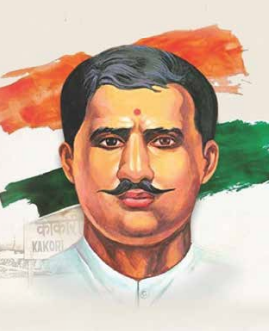In the history of India’s freedom movement, some revolutionaries not only sacrificed their lives but also wielded their pens like swords. Their spoken words and written lines became eternal symbols of patriotism—echoes that still stir hearts today. One such towering figure was Pandit Ram Prasad Bismil.

Born on 11 June 1897 in Shahjahanpur, Uttar Pradesh, to Murlidhar and Moolmati, Bismil came from a modest family background. It is said that his ancestral village was Murainwan (Barwai) near Mainpuri. Upon examining his birth chart and the rare markings on all ten fingers, an astrologer had once predicted, “If this boy survives—though the chances are slim—nothing can stop him from becoming a great emperor.”
His mother, a devout woman, named him Ram Prasad hoping he would grow up to be like Lord Ram.
Early Influences and Awakening
Bismil received his early education at home. In class 9, he came into contact with the Arya Samaj, and the teachings of Swami Dayanand Saraswati deeply influenced him. Even as a teenager, he was moved by the brutal policies of the British Raj against Indians. This exposure to injustice sparked a lifelong commitment to revolution.
He adopted the pen name “Bismil”, which means “wounded at heart.” The name itself was a reflection of his deep emotional and spiritual pain for the suffering of his country.
Writer, Revolutionary, Visionary
Bismil wasn’t just a fighter with arms—he was also a warrior of ideas. He, along with revolutionaries like Sachindranath Sanyal and Jadugopal Mukherjee, founded the Hindustan Republican Association (HRA), an organization aimed at overthrowing British rule.
To support the movement, Bismil borrowed money from his patriotic mother and published books such as:
- “Deshwasiyon ke Naam” (To the Countrymen)
- “Swadeshi Rang” (The Colors of Patriotism)
- “Man Ki Lahar” (Waves of the Mind)
- “Swadhinta Ki Devi” (The Goddess of Freedom)
The proceeds from these books were used to purchase weapons for the HRA. Bismil wrote under pseudonyms like Bismil, Ram, and Agyat (Anonymous).
He was instrumental in recruiting young revolutionaries like Chandrashekhar Azad and Bhagat Singh into the movement, which later became known as the Hindustan Socialist Republican Association (HSRA).
The Kakori Conspiracy: A Bold Strike
Bismil’s most famous act was the Kakori Conspiracy of 1925, in which he and his associates—most notably Ashfaqulla Khan—planned and executed a daring train robbery to loot British government treasury.
Their aim was not personal gain but to fund the revolutionary struggle and acquire weapons. The incident shook the British Empire. Within two months, over 30 revolutionaries were arrested. After a controversial trial, Ram Prasad Bismil, Ashfaqulla Khan, Rajendra Nath Lahiri, and Roshan Singh were sentenced to death.
The Writer Behind Bars
While in Lucknow Central Jail, Bismil penned his autobiography, which was later published in 1928 by renowned journalist Ganesh Shankar Vidyarthi. This work is considered a monumental piece of revolutionary literature in India.
During his incarceration, Bismil also composed the iconic patriotic song:
“Mera Rang De Basanti Chola”
(“O Mother, dye my robes in the color of spring/blood”)
This song became a timeless anthem of sacrifice and valor.
Final Words Before Martyrdom
On 19 December 1927, Bismil was hanged in Gorakhpur Jail. When asked about his final wish, he said only:
“The complete destruction of British rule.”
He walked to the gallows with unmatched dignity, leaving behind a legacy of courage, conviction, and creative power.
A Tribute to the Eternal Patriot
“Sarfaroshi ki tamanna ab hamaare dil mein hai,
Dekhna hai zor kitna baazu-e-qatil mein hai…”
(“The desire for revolution is in our hearts now; let us see how much strength the tyrant's arms hold…”)
Pandit Ram Prasad Bismil lives on—not only in history books but in the very spirit of India’s independence. His pen inspired millions. His courage shook an empire. And his sacrifice continues to remind us of the price of freedom.
